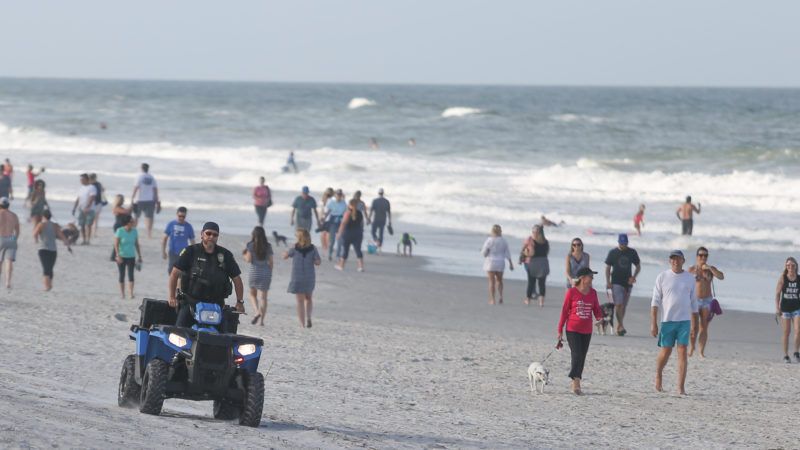Let People Go Outside
Many public health experts say the benefits outweigh the risks.

"If I get corona, I get corona," mused Florida spring breaker Brady Sluder in a now-infamous March interview with CBS. "At the end of the day, I'm not going to let it stop me from partying."
Sluder, with his sun-tinged face and backwards cap, probably didn't realize that he'd become an unwitting mascot for the perils of ignoring social distancing. Policies discouraging nearly every form of public interaction—from widespread restaurant closures to a prohibition on big box retailers selling paint—have popped up across the country in an attempt to curb the coronavirus. Some of those policies still make sense.
Closing outdoor spaces does not. That includes the beaches in Florida, which have slowly begun reopening on a county-by-county basis.
Predictably, the move wasn't without backlash. "The trouble is, Florida's not known for 'good' or 'safe,'" writes Diane Roberts, a professor of English at Florida State University, in a Washington Post op-ed. Citing the derisory "Florida man" stereotype, who is known for his ridiculous antics and disregard for the law, Roberts concludes that Floridians simply cannot be trusted with the privilege of going to the beach in times like this.
But Roberts does not cite any infectious disease specialists, who are trained to analyze the risks of such situations using science, not stereotypes. What do those experts have to say?
"It bugs me to see these restrictions on people being outside," said Edward Nardell, a professor in the departments of Environmental Health and Immunology and Infectious Diseases at the Harvard T.H. Chan School of Public Health. Nardell told Slate that he favors opening the beaches, so long as social distancing rules are put in place and enforced.
And no beach has reopened in Florida without social distancing guidelines. Jacksonville, the first city to open the proverbial floodgates, has banned sunbathing and prohibited beachgoers from bringing coolers, grills, and chairs. Organized beach sports are also forbidden. Put differently, you are allowed to walk or jog on the beach, and you are allowed to go swimming.
The beach is no bogeyman when beachgoers follow social distancing guidelines. Indeed, it might even be safer than a busy urban sidewalk, where individuals don't always have the luxury of staying six feet apart. Of course, even sidewalks are not necessarily that high of a risk. According to Daniel Kuritzkes, the chief of the infectious disease division at Brigham and Women's Hospital, "I don't think there's a real concern" about catching COVID-19 from walking past someone. Kuritzkers told Boston Magazine that such brief interactions—if you can even call them that—carry low risk for COVID-19 transmissions, though it's still recommended that everyone dons a face mask.
Many parks were also shuttered when the coronavirus first hit the U.S. Recently, some states and localities have started gradually lightening those restrictions. Low-income residents probably stand to gain the most from that, since they often lack large, comfortable living spaces to retreat to when practically all other corners of society are blocked off from public use. While everybody benefits from getting outside, the advantages are perhaps even greater for those who have been forced to shelter in place in small, crowded homes.
But the science hasn't swayed every lawmaker. Florida's beaches reopening virtually coincided with Orange County, California closing theirs after photos showed Huntington Beach and Newport Beach both teeming with sunbathing visitors. The knee-jerk reaction is understandable. But perhaps Gov. Gavin Newsom (D) could have avoided a prohibition in favor of a more measured approach, one with enhanced social distancing guidelines.
"If you're swimming more than 6 feet away from people, you're probably reasonably safe," Michael Buchmeier, a professor of infectious diseases at the University of California, Irvine, told The Guardian. "The virus is very sensitive to ultraviolet light and very sensitive to heating. It's not likely to survive in heat and sunlight."
Lucky for residents of Florida, California, and many other states, their beaches have plenty of both.


Show Comments (144)